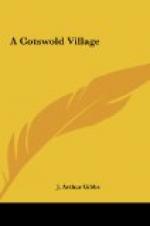The V.W.H. hounds, on Mr. Hoare’s retirement in 1886, were divided into two packs. Mr. T. Butt Miller hunts three days a week on the eastern side, with Cricklade as his centre; whilst Lord Bathurst has sufficient ground for two days on the west, where the country flanks with the Duke of Beaufort’s domain on the south and the Cotswold hounds on the north. Mr. Miller retains the original pack, and a very fine one it is. Lord Bathurst likewise, by dint of sparing no pains, and by bringing in the best blood obtainable from Belvoir, Brocklesby, and other kennels, has gradually brought his pack to a high state of excellence.
Turning to the week’s programme for a man hunting five or six days a week from Cirencester, Monday is the day for the duke’s hounds. Here you may be riding over some of the best of the grass, where light flying fences grow on the top of low banks, or else it will be a stone-wall country of mixed grass and light plough. In either case the country is very rideable, and sport usually excellent. The Badminton hounds and Lord Worcester’s skill as a huntsman are too well known to require any description here.
On Tuesday Lord Bathurst’s hounds are always within seven miles of the town, and the country is a very open one, but one that requires plenty of wet to carry scent. Though on certain days there is but little scent, in favourable seasons during recent years wonderful sport has been shown in this country. In the season of 1895-6 especially, a fine gallop came off regularly every Tuesday from October to the end of February. In ’97, on the other hand, little was done. There is far more grass than there used to be, owing to so much of the land having gone out of cultivation. The plough rides lighter than grass does in nine counties out of ten, the coverts are small, and the pace often tremendous. Every country has its drawback, and in this case it lies partly in bad scent and partly in the fences being too easy. Men who know the walls with which the Cotswold tableland is almost entirely enclosed, ride far too close to hounds: thus, the pack and the huntsman not being allowed a chance, sport is often spoiled. Occasionally, when a real scent is forthcoming, the hounds can run right away from the field; but as a rule they are shamefully over-ridden. The fact is that in the hunting field, as elsewhere, John Wolcot’s epigram, written a hundred years ago, exactly hits the nail on the head:




